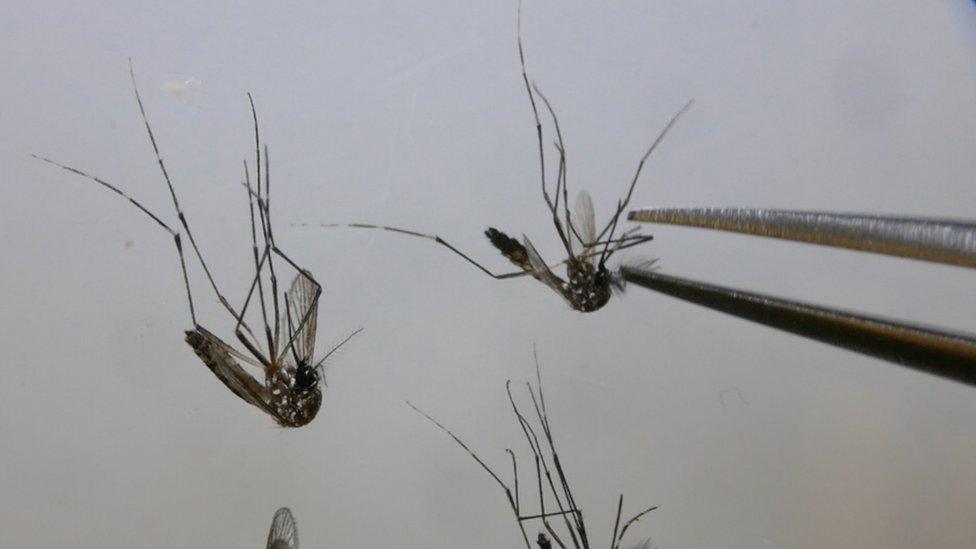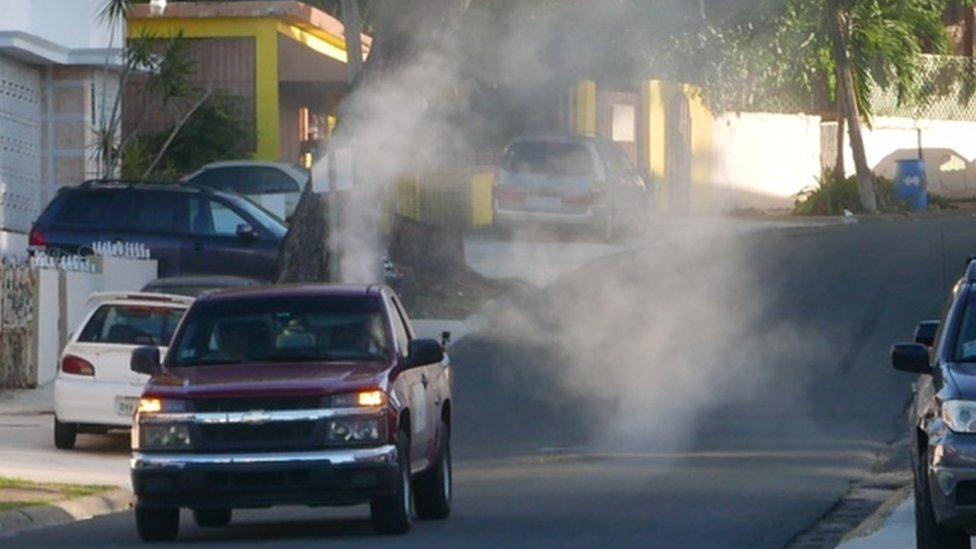Puerto Rico braced for more Zika cases
- Published

Aedes aegypti mosquitoes being studied in CDC lab in San Juan
Hundreds of thousands of people in the US territory of Puerto Rico could become infected with the Zika virus in the coming months, according to the director of America's Centre for Disease Control.
Dr Tom Frieden says this could lead to "thousands" of brain-damaged babies.
Zika has now been reported in 31 countries and territories in the Americas, with Brazil the worst hit.
There have been about 100 cases of Zika reported in mainland US.
These were in travellers who had recently returned from Zika-hit countries.
The Aedes aegypti mosquito that spreads the virus can be found in about a dozen US states, so the mainland is bracing itself for locally transmitted infections very soon.
Southern states such as Florida and Texas are particularly vulnerable.
But Dr Frieden - who is advising the president on this emergency - says Puerto Rico is the biggest concern for the US.
US scientists discuss the growing threat from Zika
There have been almost 120 cases there so far.
"Close to 90% of adults in Puerto Rico have been infected with dengue [which is transmitted by the same mosquito as Zika]… so we need to do everything possible to reduce the risk to pregnant women there," Dr Frieden says.
Zika is not considered particularly dangerous in most people, but there is a strongly suspected link between the virus and babies being born with under-developed brains.
"This possible or probable association with microcephaly is extraordinarily unusual," says Dr Frieden
"We're not aware of any previous infection spread by mosquitoes that can cause a potentially devastating foetal malformation."

Zika in the US
93 imported cases, nine of them pregnant women
one baby born with microcephaly
about a dozen states at risk of local Zika transmission

On the frontline of the US' fight against Zika, CDC scientists in Puerto Rico are urgently trying to find new tools to fight these mosquitoes.
The insects have been on the island for many centuries, spreading dengue and, more recently, chikungunya. And they have started to become resistant to the main insecticides used to kill them.
Scientists at the CDC's dengue branch in the Puerto Rican capital, San Juan, are urgently trying to establish which insecticides are still effective.
Take a tour of the CDC's Zika situation room
They are breeding the Zika-transmitting mosquitoes in their labs to test.
The eggs hatch and then undergo metamorphosis from pupae into adult flying mosquitoes within just a few days.
The mosquitoes live only for a couple of weeks, but that is more than enough time to spread disease, and anxiety.
Worryingly, it is becoming increasingly difficult to eliminate them.
"These mosquitoes are resistant to one of the most commonly used insecticides." says lead entomologist Dr Roberto Barrera.
"Permethrin has been used in Puerto Rico and the rest of the Americas for many years, but it doesn't work as well any more."
Dr Barrera's team will report back in the next couple of weeks on what other chemicals can be used.
In the meantime, fumigators go through residential areas spraying entire neighbourhoods with the less effective insecticide.
It is the best health authorities here have right now.

Health officials spray insecticide in a neighbourhood with reported Zika cases
Despite the outbreak, tourism is still strong, with two enormous cruise ships docked in the harbour in old San Juan.
Most people are walking around in shorts and T-shirts, with their arms and legs exposed.
Everyone seems pretty relaxed.
It is only pregnant women who are being advised against travel to Zika-hit areas.
A causative link between Zika and microcephaly has yet to be confirmed.
But until more is known, health officials have to assume there is one.
"There is a lot we don't know," Dr Frieden says.
"If an infant is born to a woman who had Zika, and does not have microcephaly, do they have other problems?
"It may not become apparent for months or years to come."

Joan Ballista is 28 weeks pregnant. She is extremely anxious about Zika affecting her baby
That uncertainty is constantly on the mind of Joan Ballista, 28.
She is 24 weeks pregnant, and terrified she could become infected - most people who contract the disease do not even know they have it.
She has dropped into a Ministry of Health Women, Infants and Children clinic set up in the city's main shopping centre to give advice to expectant mothers.
"I am very worried" she says.
"I use repellent every day. I put it on when I wake up, when I go to bed. I really worry. Microcephaly is such a sad disease."

Advice to travellers
Reconsider travel to Zika-hit countries if you are pregnant
All travellers should avoid getting bitten
Wear long sleeves and trousers
Wear insect repellent
Stay in places with air conditioning or that use window and door screens to keep mosquitoes outside
Source: US CDC
